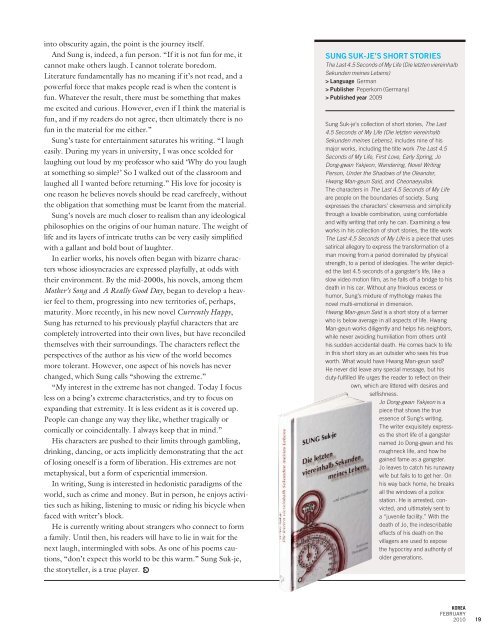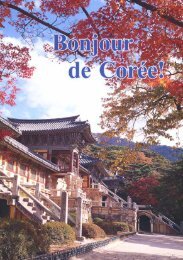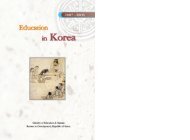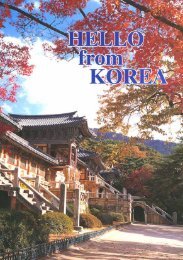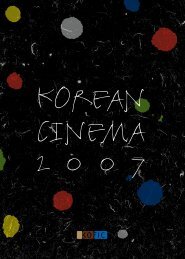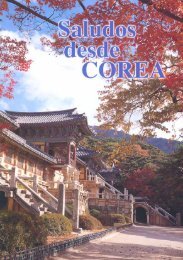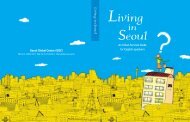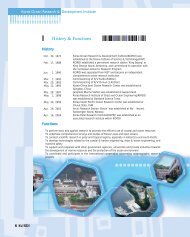www.korea.net
KOREAN MOVIES - Korea.net
KOREAN MOVIES - Korea.net
- No tags were found...
You also want an ePaper? Increase the reach of your titles
YUMPU automatically turns print PDFs into web optimized ePapers that Google loves.
into obscurity again, the point is the journey itself.<br />
And Sung is, indeed, a fun person. “If it is not fun for me, it<br />
cannot make others laugh. I cannot tolerate boredom.<br />
Literature fundamentally has no meaning if it’s not read, and a<br />
powerful force that makes people read is when the content is<br />
fun. Whatever the result, there must be something that makes<br />
me excited and curious. However, even if I think the material is<br />
fun, and if my readers do not agree, then ultimately there is no<br />
fun in the material for me either.”<br />
Sung’s taste for entertainment saturates his writing. “I laugh<br />
easily. During my years in university, I was once scolded for<br />
laughing out loud by my professor who said ‘Why do you laugh<br />
at something so simple?’ So I walked out of the classroom and<br />
laughed all I wanted before returning.” His love for jocosity is<br />
one reason he believes novels should be read carefreely, without<br />
the obligation that something must be learnt from the material.<br />
Sung’s novels are much closer to realism than any ideological<br />
philosophies on the origins of our human nature. The weight of<br />
life and its layers of intricate truths can be very easily simplified<br />
with a gallant and bold bout of laughter.<br />
In earlier works, his novels often began with bizarre characters<br />
whose idiosyncracies are expressed playfully, at odds with<br />
their environment. By the mid-2000s, his novels, among them<br />
Mother’s Song and A Really Good Day, began to develop a heavier<br />
feel to them, progressing into new territories of, perhaps,<br />
maturity. More recently, in his new novel Currently Happy,<br />
Sung has returned to his previously playful characters that are<br />
completely introverted into their own lives, but have reconciled<br />
themselves with their surroundings. The characters reflect the<br />
perspectives of the author as his view of the world becomes<br />
more tolerant. However, one aspect of his novels has never<br />
changed, which Sung calls “showing the extreme.”<br />
“My interest in the extreme has not changed. Today I focus<br />
less on a being’s extreme characteristics, and try to focus on<br />
expanding that extremity. It is less evident as it is covered up.<br />
People can change any way they like, whether tragically or<br />
comically or coincidentally. I always keep that in mind.”<br />
His characters are pushed to their limits through gambling,<br />
drinking, dancing, or acts implicitly demonstrating that the act<br />
of losing oneself is a form of liberation. His extremes are not<br />
metaphysical, but a form of experiential immersion.<br />
In writing, Sung is interested in hedonistic paradigms of the<br />
world, such as crime and money. But in person, he enjoys activities<br />
such as hiking, listening to music or riding his bicycle when<br />
faced with writer’s block.<br />
He is currently writing about strangers who connect to form<br />
a family. Until then, his readers will have to lie in wait for the<br />
next laugh, intermingled with sobs. As one of his poems cautions,<br />
“don’t expect this world to be this warm.” Sung Suk-je,<br />
the storyteller, is a true player.<br />
SUNG SUK-JE’S SHORT STORIES<br />
The Last 4.5 Seconds of My Life (Die letzten viereinhalb<br />
Sekunden meines Lebens)<br />
> Language German<br />
> Publisher Peperkorn (Germany)<br />
> Published year 2009<br />
Sung Suk-je’s collection of short stories, The Last<br />
4.5 Seconds of My Life (Die letzten viereinhalb<br />
Sekunden meines Lebens), includes nine of his<br />
major works, including the title work The Last 4.5<br />
Seconds of My Life, First Love, Early Spring, Jo<br />
Dong-gwan Yakjeon, Wandering, Novel Writing<br />
Person, Under the Shadows of the Oleander,<br />
Hwang Man-geun Said, and Cheonaeyullak.<br />
The characters in The Last 4.5 Seconds of My Life<br />
are people on the boundaries of society. Sung<br />
expresses the characters’ cleverness and simplicity<br />
through a lovable combination, using comfortable<br />
and witty writing that only he can. Examining a few<br />
works in his collection of short stories, the title work<br />
The Last 4.5 Seconds of My Life is a piece that uses<br />
satirical allegory to express the transformation of a<br />
man moving from a period dominated by physical<br />
strength, to a period of ideologies. The writer depicted<br />
the last 4.5 seconds of a gangster’s life, like a<br />
slow video motion film, as he falls off a bridge to his<br />
death in his car. Without any frivolous excess or<br />
humor, Sung’s mixture of mythology makes the<br />
novel multi-emotional in dimension.<br />
Hwang Man-geun Said is a short story of a farmer<br />
who is below average in all aspects of life. Hwang<br />
Man-geun works diligently and helps his neighbors,<br />
while never avoiding humiliation from others until<br />
his sudden accidental death. He comes back to life<br />
in this short story as an outsider who sees his true<br />
worth. What would have Hwang Man-geun said?<br />
He never did leave any special message, but his<br />
duty-fulfilled life urges the reader to reflect on their<br />
own, which are littered with desires and<br />
selfishness.<br />
Jo Dong-gwan Yakjeon is a<br />
piece that shows the true<br />
essence of Sung’s writing.<br />
The writer exquisitely expresses<br />
the short life of a gangster<br />
named Jo Dong-gwan and his<br />
roughneck life, and how he<br />
gained fame as a gangster.<br />
Jo leaves to catch his runaway<br />
wife but fails to to get her. On<br />
his way back home, he breaks<br />
all the windows of a police<br />
station. He is arrested, convicted,<br />
and ultimately sent to<br />
a “juvenile facility.” With the<br />
death of Jo, the indescribable<br />
effects of his death on the<br />
villagers are used to expose<br />
the hypocrisy and authority of<br />
older generations.<br />
KOREA<br />
FEBRUARY<br />
2010<br />
19


